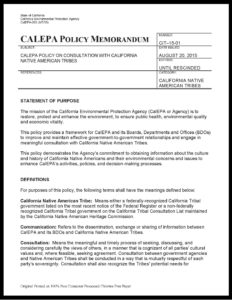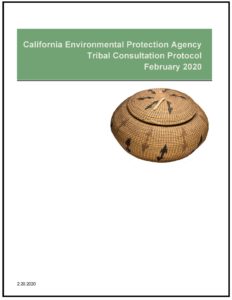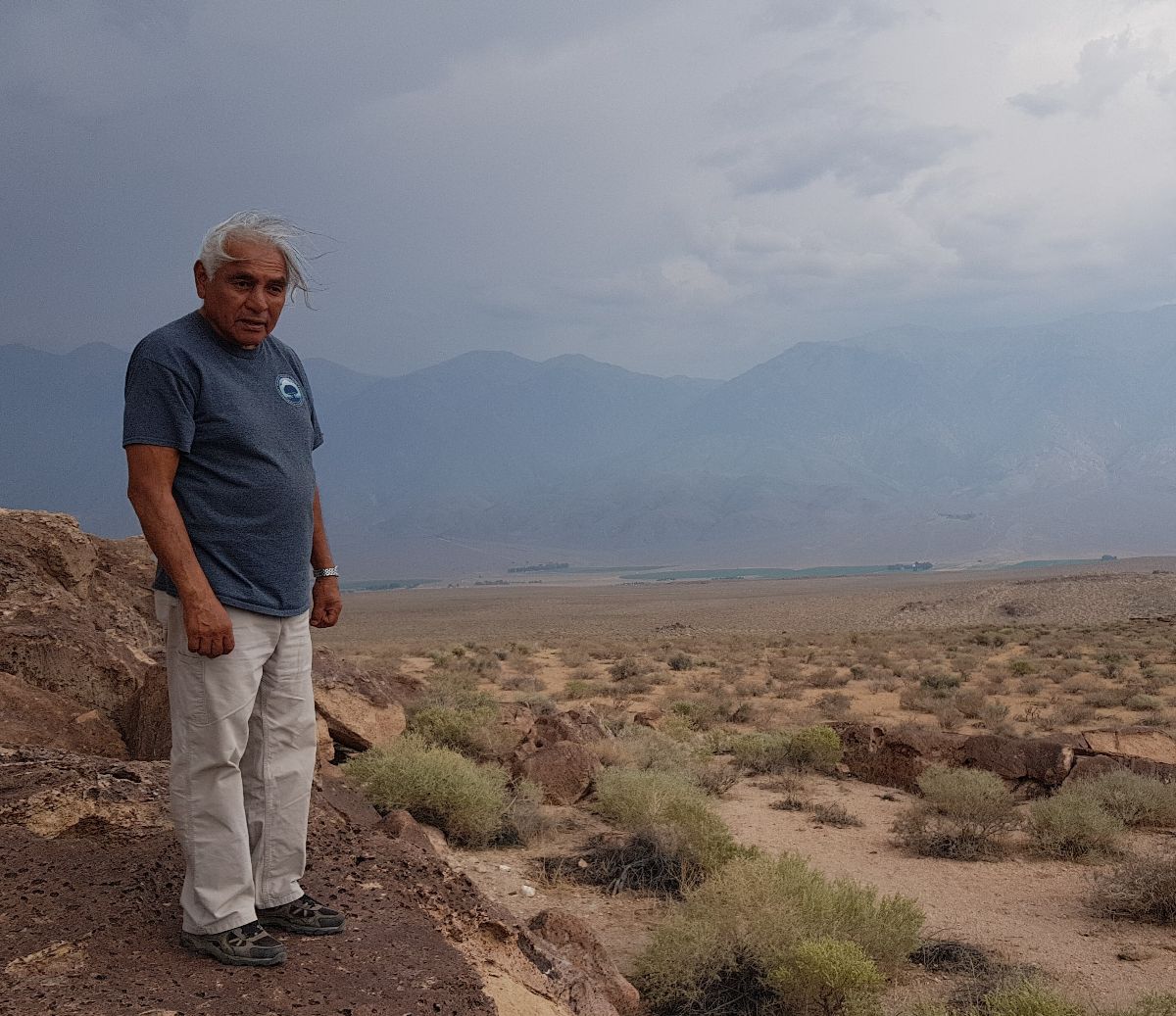Tribal Affairs
CalEPA and its boards, departments, and office (BDOs) are committed to improving
our communication and working relationships with California Native American Tribes.
Key Information
About CalEPA Tribal Affairs
CalEPA and its boards, departments, and office (BDOs) are committed to improving our communication and working relationships with California Native American Tribes. CalEPA aims to cultivate and ensure the meaningful participation and inclusion of tribal governments and communities within the work of the Agency, supporting the effective integration of these governments’ and communities’ interests in environmental policymaking. These efforts seek to advance programs, policies, regulations, and new laws to strengthen these working relationships, and coordinate tribal affairs across the Agency and with external governments and organizations.
Updated Disadvantaged Communities Designation
Senate Bill (SB) 535 (De León, Chapter 830, Statutes of 2012) mandates that California use certain Cap-and-Trade auction proceeds to fund investments in “disadvantaged communities” (DACs). It charges CalEPA with the responsibility to designate DACs. In May 2022, CalEPA updated the Designation of Disadvantaged Communities. CalEPA formally designates four categories of geographic areas as disadvantaged, including “lands under the control of federally recognized Tribes.” For detailed explanation of each of the categories, please read the document: Final Designation of Disadvantaged Communities Pursuant to Senate Bill 535 May 2022
CalEPA Tribal Consultation Policy
 CalEPA first adopted its Tribal Consultation Policy in 2009 to guide CalEPA and all its BDOs in their daily operations to work with California Native American Tribes in a knowledgeable, sensitive, and respectful manner. In August 2015, CalEPA revised and updated the Tribal Consultation Policy to strengthen and enhance the objectives outlined in this agency-wide guidance document. The 2015 CalEPA Policy on Consultation with California Native American Tribes (PDF) details how CalEPA and its BDOs will continue to work to improve and strengthen its relationships with Tribal governments and Tribal communities. Please refer to the Tribal Policy Revision Background page to find out more about how our Tribal Consultation Policy was revised.
CalEPA first adopted its Tribal Consultation Policy in 2009 to guide CalEPA and all its BDOs in their daily operations to work with California Native American Tribes in a knowledgeable, sensitive, and respectful manner. In August 2015, CalEPA revised and updated the Tribal Consultation Policy to strengthen and enhance the objectives outlined in this agency-wide guidance document. The 2015 CalEPA Policy on Consultation with California Native American Tribes (PDF) details how CalEPA and its BDOs will continue to work to improve and strengthen its relationships with Tribal governments and Tribal communities. Please refer to the Tribal Policy Revision Background page to find out more about how our Tribal Consultation Policy was revised.
CalEPA implements its Tribal Policy with the assistance of our Tribal Advisory Committee, made up of representatives from federally and non-federally recognized Tribes, and the input of interested Tribal governments, communities, and stakeholders.
CalEPA Tribal Consultation Protocol

In February 2020, CalEPA adopted its Tribal Consultation Protocol (Tribal Protocol) as part of its Tribal Policy implementation and to provide guidance to CalEPA and its BDOs when conducting government-to-government consultations and engaging with California Native American Tribes. The Tribal Protocol builds upon the Tribal Policy and provides a step-by-step process that includes a set of best practices when engaging with Tribe in meaningful, inclusive, and mutually respectful way. This Tribal Protocol is for use by our staff and the staff at each of our BDOs.
CalEPA Tribal Affairs Program In Remembrance – Harry Williams
Tribal Advisory Committee Member Harry Williams (1956-2021) – A Warrior, Water (Paya) Protector, mentor, and friend to many – He dedicated his life to activism and advocating for the land, water, and people. It was an honor to have him share his valuable time and expertise on the CalEPA Tribal Advisory Committee as representative and elder of the Bishop Paiute Tribe. He will missed and always remembered in fond memory.
Policies of Boards, Departments and Office
CalEPA’s Boards, Departments, and Office have adopted and are working to develop individual and BDO-specific tribal policies. These tribal policies are specific to each BDO’s authority, activities, and purview.
California Air Resources Board
Tribal Consultation Policy (adopted October 2018) – Tribal Liaison Dilley presented the Policy for consideration of adoption to the Board on October 25, 2018. The Board adopted its Tribal policy with supportive comments. Should you have any questions regarding this CARB draft Tribal Consultation policy, please contact Laura Morgan, CARB Tribal Liaison, at (279) 895-5673 or via email at Laura.Morgan@arb.ca.gov.
CalRecycle
CalRecycle is developing a tribal consultation policy. For questions or more information, please contact Katrina Leni-Konig, CalRecycle Deputy Director in the Office of Environmental Justice, Tribal Relations, Education, and Outreach, at (916) 812-4427 or via email at tribalaffairs@calrecycle.ca.gov.
Department of Pesticide Regulation
Tribal Consultation Policy (adopted April 2019) PDF download – DPR is adopted its Tribal Consultation Policy to improve communication and coordination with California Native American Tribes, its enforcement partners, and the county agricultural commissioners. The DPR Tribal Policy includes background information to prepare DPR staff for successful communication related to pesticides, with Tribal representatives. Should you have any questions regarding the DPR’s Tribal Consultation policy, please contact Celia Pazos, DPR Tribal Liaison, at (916) 639-0468 or via email at Celia.Pazos@cdpr.ca.gov.
Department of Toxic Substances Control
Tribal Consultation Policy (adopted March 2020PDF download) PDF download. DTSC’s Tribal Policy outlines the tribal consultation process with the foundational principles of collaboration, communication, education, and Tribal sovereignty. Should you have any questions regarding the DTSC Tribal Consultation policy, please contact Andres Martinez at (916) 701-3517 or via email at Andres.Martinez@dtsc.ca.gov.
Office of Environmental Health Hazard Assessment
Tribal Consultation Policy (adopted January 2019). The OEHHA Tribal Policy provides a framework for OEHHA to establish and maintain effective government-to-government relationships and engage in meaningful consultation with California Native American Tribes. Should you have any questions regarding the OEHHA Tribal Consultation policy, please contact OEHHA Co-Tribal Liaison Laura August at Laura.August@oehha.ca.gov or Co-Tribal Liaison Paula Torrado Plazas at paula.torradoplazas@oehha.ca.gov.
State Water Resources Control Board
Tribal Consultation Policy (adopted June 2019) PDF download. In June 2019 the State Water Board finalized its Tribal Consultation Policy to reaffirm collaboration and input from all California Native American Tribes. Should you have any questions regarding the SWRCB draft Tribal Consultation policy, please contact Adriana Renteria, SWRCB Tribal Liaison, via email at Tribal-liaison@waterboards.ca.gov.
Additional Resources
The Governor’s Office of Tribal Affairs
The Governor’s Office of Tribal Affairs, originally established as the Governor’s Office of the Tribal Advisor by Executive Order B-10-11 and codified through AB 880 (Gray, 2018), is part of Governor Gavin Newsom’s Administration. Under the direction of the Tribal Affairs Secretary, the Office reports directly to Governor Newsom and is responsible for overseeing and implementing effective government-to-government consultation between the Governor’s Administration and California tribes on policies that affect California tribal communities. The Secretary’s charge is to serve as a direct link between the tribes in California and the Governor, facilitate communication and consultations between tribes and state agencies, and review state legislation and regulations affecting tribes and provide recommendations.
On June 18, 2019, Governor Gavin Newsom issued Executive Order N-15-19, which acknowledges and apologizes on behalf of the State for the historical “violence, exploitation, dispossession and the attempted destruction of tribal communities” which dislocated California Native Americans from their ancestral land and sacred practices and establishes the California Truth and Healing Council. The destructive impacts of this forceful separation persist today, and meaningful, reparative action from the State of California (State) can begin to address these wrongs in an effort to heal its relationship with California Native Americans.
In addition, Executive Order N-15-19 reaffirms and incorporates by reference the principles of government-to-government engagement established by Executive Order B-10-11 (“it is the policy of the administration that every state agency and department subject to executive control is to encourage communication and consultation with California Native American tribes”). The State continues to work with California tribes on a government-to-government basis to address issues concerning Native American tribal self-governance and tribal trust resources.
On September 25, 2020, the Governor released a Statement of Administration Policy on Native American Ancestral Lands to encourage State entities to seek opportunities to support California tribes’ co-management of and access to natural lands that are within a California tribe’s ancestral land and under the ownership or control of the State of California, and to work cooperatively with California tribes that are interested in acquiring natural lands in excess of State needs.


